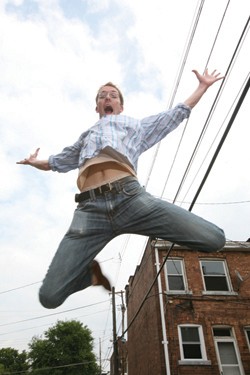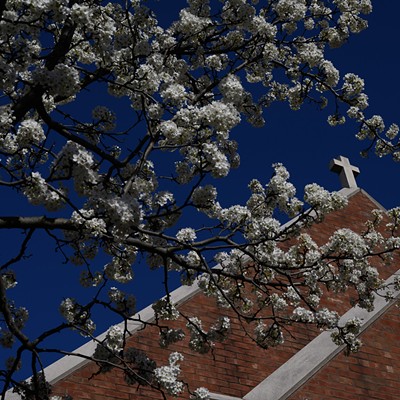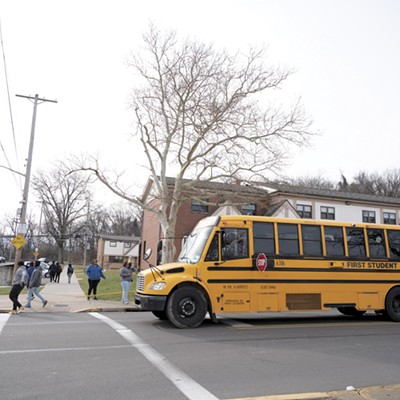David Bernabo's musical style could perhaps best be described as a stylish concoction in which folk collides with electronics, avant rock with pop, noisy improv with a touch of hip hop.
Jazz guitar, keys, beats? He can play that. Groups, solo, something in between? He can make that happen. He'll cite Jim O'Rourke, David Grubbs and Paul Klee as major influences ... while also being a huge Wilco fan.
What is a constant -- aside from his wavering, evocative voice -- is Bernabo's self-imposed workload.
Over the last six months, Bernabo has released a solo EP, McQueen Bear, and a full-length album, Assembly, on Sort-Of Records. He's also curated "Woodlab," a bi-weekly showcase that results in a monthly compilation CD, which often features Bernabo's production skills, compositions and the odd sideman credit. And then there's his other projects: a new revolving band called the Ninth Ward, which he describes as "guitar-store rock," and his new improvisational group DBL D. Which also just put out an album.
"All the bands I'm in now are pretty low-commitment, and with so little time, all the projects I do have to have some immediate output," Bernabo says. With DBL D, for example, "we've only played together six times, but we have two records, I guess.
"I'm very close to burning out," he jokes. "Any day now, really."
Yet this is nothing new for Bernabo -- it started way back when he was growing up in Greenfield and the North Hills. "I started recording in fifth grade, with my dad's tape recorder that had a mic input," he says. "I had a band called Napoleon in fifth grade, and every time we practiced, I made a record. It just became a habit after awhile."
Ancient history aside, Bernabo's real debut on the Pittsburgh music scene came when he began studying finance at Carnegie Mellon and joined Eric Graff's indie rock ensemble Boxstep. Bernabo and drummer Greg Cislon eventually split off from the group to form their own more avant-rock concern, Vale and Year, which became a prominent act on the local scene. It also cemented the pattern for Bernabo's recording fixation: seven albums released between 2004 and 2006, plus several more unreleased and "in the can."
"We were doing so much material at such a fast pace [that] we didn't really go outside the band for many projects," he says. "And then after that, I'm like, 'Oh, there's all this talent in Pittsburgh, and it would be fun to work with different folks.'"
While he'll spend days or weeks at Graff's Lawrenceville studio, or recording in his spare bedroom in Bloomfield, Bernabo has a strong impulse toward the social functions of music.
Indeed, bringing diverse musicians together seems one of his principal strengths. It's also no small feat in Pittsburgh's often-contentious scene. Part of that ability no doubt stems from his quiet, seemingly ego-less manner; part of it is the result of the audience that is drawn to his experimental yet very musical output. "I think none of the music I've ever really played has been too 'hip,' so you mainly get musicians at stuff I'm doing," he acknowledges. "Not other 'fans' really."
He's also helped build a community through Woodlab, which is held at ModernFormations gallery and largely features local acoustic and improvisational music. "There are a lot of people who haven't met each other, who played shows together" at Woodlab, Bernabo notes. "There's a lot of people doing good stuff, and they might as well know each other in such a small town."
These days, Bernabo is expanding his range to include visual art. He has written several comics published by the Unicorn Mountain art collective (which also released the DBL D album), and his first solo art show is opening in August at ModernFormations. "It's a big relief from not working on music constantly," Bernabo says. Even then, though, music has a way of creeping in: Part of his upcoming show, First Haunt, includes experiments with graphic scores.
"The stuff I'm doing right now is with ink and pen, for the most part," he says. "So there's some traditional notation, but mainly there's kinda symbols or ... blobs. It's just a way you look at something and try to interpret musically -- hopefully it gets you outside your comfort zone and allows you to play something new. It's also a good exercise for me to try to develop something new I want to play without actually playing it yet. To just keep challenging myself. Because I hate to repeat anything."














